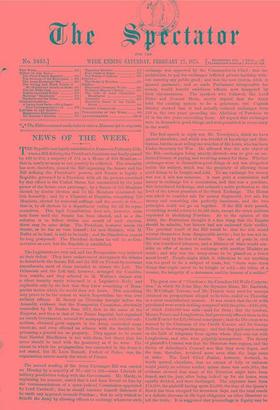The first speech in reply was Mr. Trevelyan's, which we
have quoted elsewhere, and which was brimful of knowledge and illus- tration, but the most telling one was that of Mr. Lowe, who has been Under-Secretary for War. He affirmed that the sole object of the Bill—exchanges being already allowed—was to give an un- limited licence of paying and receiving money for them. Whether exchanges were in themselves good things or not was altogether beside the subject, which was the propriety of allowing those good things to be bought and sold. To say exchange for money was not a sale was nonsense. A man gave a commission and money in exchange for a commission, and that was a purchase. Sale introduced brokerage, and reduced a noble profession to the level of the lowest practices of the Stock Exchange. The House was asked to consider sale for money disgraceful, but sale for money and something else perfectly innocuous, and the two principles could not go on together. If the Bill were passed, everything would return to its old state, except the seven millions expended in abolishing Purchase. As to the opinion of the Army, the Prwtorians thought it a fine thing that the Empire should be saleable, but history had not endorsed their verdict. The practical result of the Bill would be that the rich would exempt themselves from disagreeable service ; but he was not in- fluenced only by the fear of results. The sale of posts in civil life was considered infamous, and a Minister of State would con- sider an offer of money to exchange with another Minister an insult ; and why was the Army alone to be placed on a lower moral level? People might think it ridiculous to say anything was too good to be a subject of trade, but "there were three things that ought never to be bought or sold,—the virtue of a woman, the integrity of a statesman, and the honour of a soldier."


































